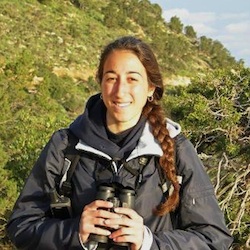Christina Ieronymidou
European Species Programme Officer at BirdLife Europe and Central Asia
BirdLife International, Cambridge , UK
Find Christina on Twitter @cieronymidou
Involved with the BOU as:
Social Media Officer, Engagement Committee
BOU member since: 2011
Most likely to be found . . .
. . . wishing I could be doing my PhD fieldwork in Cyprus again.
What is your role on the BOU Council or committee on which you sit?
My role is to support the BOU Blog by encouraging contributions and helping authors prepare their blog articles, and to support the BOU social media presence on Twitter and Facebook.
What do you enjoy most about your involvement with the BOU?
Being a member of BOU has allowed me to keep in touch with an extended network of ornithologists, both online through social media, and in person at BOU conferences. It can be very easy to lose touch with researchers and their work when you leave the academic sphere and as a conservation scientist in an NGO it is very important to me and my work to be up to date with ongoing research. I am especially lucky in my role as Social Media Officer because I get to hear about the newest publications that are in press and I have the opportunity to interact with the authors. Of course, all this networking blends seamlessly into social activities and lots of fun to be had. The atmosphere at the BOU Conference says it all! See you at the next one?
What would you say to anyone who is considering joining (or leaving!) the BOU?
If you are considering joining, I would say “what are you waiting for?” The BOU community is not only a joy to be a part of, it is also an incredibly useful resource. In my opinion, this is especially true for early career researchers or ornithologists based in NGOs, like myself.
If you are considering leaving, then I would encourage you to reconsider! Apart from all the benefits to you as an individual scientist (like the preferential rates to BOU Conferences, access to funding opportunities and access to IBIS), your membership supports the international ornithology community. Stick around and tell us how we can make the BOU more relevant for you!
When did your interest in ornithology begin?
Actually, I was a bit of a reluctant ornithologist! For my Master’s dissertation, I wanted to do conservation-relevant research in Cyprus, my home country. So I approached BirdLife Cyprus, who hooked me up with a nice little piece of work on the endemic subspecies of Scops Owl. Then, in my search for a policy-relevant conservation ecology PhD, I bumped into Paul Dolman (University of East Anglia and Chair of BOU Grants Committee) and Nigel Collar (BirdLife), who became my PhD supervisors and took a leap of faith with me. I, a non-birder, was about to embark on a study that hinged on strong bird identification skills in the field to assess the effect of agricultural land-uses on the farmland bird community of the island. As luck would have it, I turned out to be pretty good at surveying birds! So I thought: “maybe birds and I are meant to be”. I am happy to still be a part of the BirdLife family and of the ornithology community, but it does make me sad that I no longer get to go in the field.
What do you consider is your most significant ornithological contribution to date?
It’s funny how everything I’ve worked on in my career so far has felt like the be-all and end-all of my small world: my PhD on the conservation of farmland birds in Cyprus; the Wildlife Comeback in Europe study; but the latest addition is actually really important: BirdLife International’s European Red List of Birds is a review of the regional threat status of all the wild bird species in Europe, according to the IUCN Regional Guidelines and Criteria. The two earlier assessments it builds on – the Birds in Europe volumes of 1994 and 2004 – both had massive impacts on conservation, research and policy and the 2015 European Red List of Birds will help set conservation priorities for the coming years. No pressure!
What is your favourite outdoor place and why?
The countryside of Cyprus, because even though it might not be especially exotic and even though it is under attack by building development and land-use change, the natural and cultural heritage that fills it is nothing short of beautiful. Somewhere more specific? Akamas. Google it.


